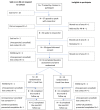Video feedback parent-infant intervention for mothers experiencing enduring difficulties in managing emotions and relationships: A randomised controlled feasibility trial
- PMID: 36018275
- PMCID: PMC9804867
- DOI: 10.1111/bjc.12388
Video feedback parent-infant intervention for mothers experiencing enduring difficulties in managing emotions and relationships: A randomised controlled feasibility trial
Abstract
Objectives: Parents experiencing mental health difficulties consistent with "personality disorder", often related to a history of complex trauma, may face increased challenges in parent-child relationships and child socioemotional development. There are no published randomised controlled trials (RCTs) evaluating perinatal parent-child interventions for this population. We evaluated the feasibility and acceptability of undertaking an RCT of the video feedback intervention for positive parenting adapted for perinatal mental health (VIPP-PMH).
Design: Feasibility study incorporating a pilot RCT.
Methods: Mothers with enduring difficulties in managing emotions and relationships, consistent with a "personality disorder", and their 6- to 36-month old infants were randomly allocated to receive six sessions of VIPP-PMH (n = 20) or usual care alone (n = 14).
Results: 76% of eligible mothers consented to participate. Intervention uptake and completion rates were 95% (≥1 VIPP-PMH session) and 70% (6 sessions), respectively. Follow-up rates were 85% at month 5 and 65% at month 8 post-baseline. Blinded observer-ratings of maternal sensitivity in parent-child interaction favoured the intervention group at month 5 (RR = 1.94, 95% CI 0.67-5.63) and month 8 (RR = 1.91, 95% CI 0.68-5.33). Small changes over time in self-rated parenting confidence and stress favoured the intervention group. There were no clear intervention effects on maternal non-intrusiveness or mental health, or on child behaviour problems, emotional functioning, or self-regulation.
Conclusions: An RCT of VIPP-PMH is feasible and acceptable to implement with mothers experiencing difficulties consistent with perinatal "personality disorder". A fully powered definitive RCT should be undertaken.
Keywords: infant mental health; parent-infant intervention; perinatal mental health; randomised controlled trial.
© 2022 The Authors. British Journal of Clinical Psychology published by John Wiley & Sons Ltd on behalf of British Psychological Society.
Conflict of interest statement
All authors declare no conflicts of interest.
Figures




Similar articles
-
Mother and clinician experiences of a trial of a video feedback parent-infant intervention for mothers experiencing difficulties consistent with 'personality disorder': A qualitative interview study.Psychol Psychother. 2023 Jun;96(2):480-503. doi: 10.1111/papt.12453. Epub 2023 Feb 22. Psychol Psychother. 2023. PMID: 36811224 Clinical Trial.
-
A video-feedback parenting intervention to prevent enduring behaviour problems in at-risk children aged 12-36 months: the Healthy Start, Happy Start RCT.Health Technol Assess. 2021 May;25(29):1-84. doi: 10.3310/hta25290. Health Technol Assess. 2021. PMID: 34018919 Free PMC article. Clinical Trial.
-
Video feedback for young babies and maternal perinatal mental illness: intervention adaptation, feasibility and acceptability.J Reprod Infant Psychol. 2025 Sep;43(5):1214-1230. doi: 10.1080/02646838.2024.2322636. Epub 2024 Mar 5. J Reprod Infant Psychol. 2025. PMID: 38441072
-
The effectiveness of VIPP-V parenting training for parents of young children with a visual or visual-and-intellectual disability: study protocol of a multicenter randomized controlled trial.Trials. 2015 Sep 9;16:401. doi: 10.1186/s13063-015-0916-6. Trials. 2015. PMID: 26353825 Free PMC article. Clinical Trial.
-
Parent-mediated interventions for promoting communication and language development in young children with Down syndrome.Cochrane Database Syst Rev. 2018 Oct 15;10(10):CD012089. doi: 10.1002/14651858.CD012089.pub2. Cochrane Database Syst Rev. 2018. PMID: 30321454 Free PMC article. Review.
Cited by
-
"I always wondered if my baby is able to feel my love for them" - Development and pilot testing of two behavioural feedback strategies designed to improve maternal self-efficacy.Wellcome Open Res. 2025 May 9;10:47. doi: 10.12688/wellcomeopenres.23564.2. eCollection 2025. Wellcome Open Res. 2025. PMID: 40443798 Free PMC article.
References
-
- Abela, J. R. Z. , Skitch, S. A. , Auerbach, R. P. , & Adams, P. (2005). The impact of parental borderline personality disorder on vulnerability to depression in children of affectively ill parents. Journal of Personality Disorders, 19, 68–83. - PubMed
-
- Achenbach, T. M. (1992). Manual for the Child Behavior Checklist/2‐3 and Profile. University of Vermont Department of Psychiatry.
-
- Alink, L. R. A. , Mesman, J. , Van Zeijl, J. , Stolk, M. N. , Juffer, F. , Bakermans‐Kranenburg, M. J. , Van IJzendoorn, M. H. , & Koot, H. M. (2009). Maternal sensitivity moderates the relation between negative discipline and aggression in early childhood. Social Development, 18, 99–120.
-
- Bakermans‐Kranenburg, M. J. , van Ijzendoorn, M. H. , & Juffer, F. (2003). Less is more: meta‐analysis of sensitivity and attachment interventions in early childhood. Psychological Bulletin, 129, 195–215. - PubMed
-
- Barnow, S. , Spitzer, C. , Grabe, H. J. , Kessler, C. , & Freyberger, H. J. (2006). Individual characteristics, familial experience, and psychopathology in children of mothers with borderline personality disorder. Journal of the American Academy of Child & Adolescent Psychiatry, 45(8), 965–972. - PubMed
MeSH terms
Grants and funding
LinkOut - more resources
Full Text Sources

